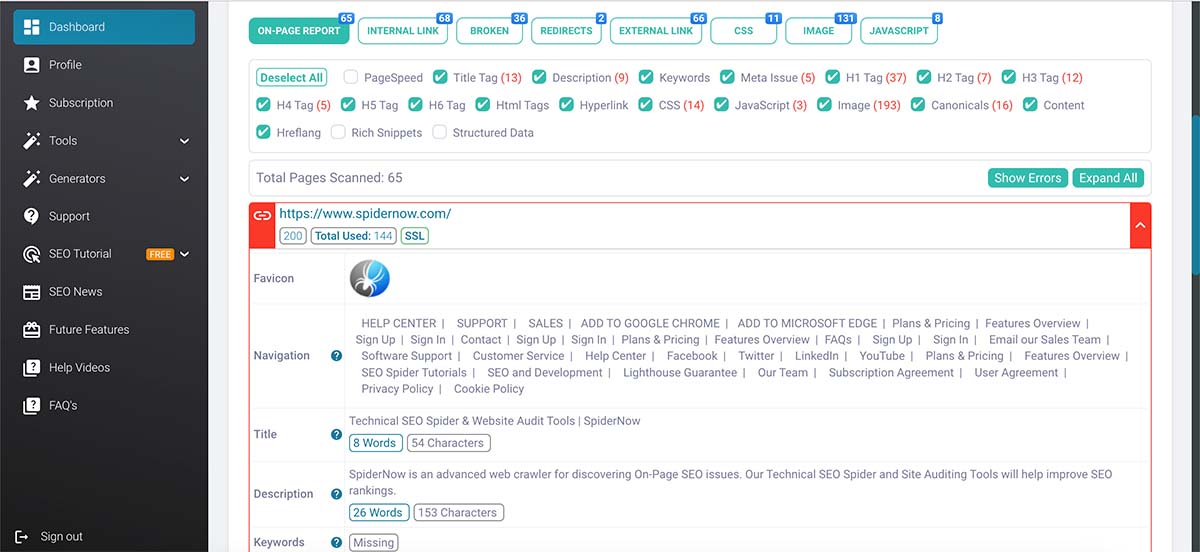Essential Technical SEO Audit Tools
Understand the various SEO tools that you can use to implement changes to make your website rise in the SERPs

SEO Practices You Should Focus On
One of the most important factors in marketing your website is gaining organic rankings since it affects every aspect of your digital marketing, including paid Google and Bing ads. While most people talk about Organic Marketing, they do not always take the time to fully understand how to rank your website properly. The first step is understanding four factors. The first and most important of these factors by far is Relevancy. The second one is coding your website properly for Speed, Performance, Accessibility, Best Practices, and SEO through Lighthouse to measure the quality of the web pages. The third is on-page SEO and the fourth is off-page SEO.
Understanding SEO Relevancy
Everything you add to your website needs to be relevant to the overall theme of your website. This means that all of the information you include on your website, such as content, images, H-tags, keywords, blog posts, links, reviews, etc. all need to be information that ties in with what your website is really about. It also means that everything you put on your website must be information that your users are looking for, find interesting, and want to engage with. Remember, search engines are in the business of serving the best and most relevant content to their users so that they will keep coming back to them. Give them what they’re looking for and you’ll be rewarded with higher rankings. Once your website has been deemed relevant by the search engines, new content you put up will enjoy a boost in the SERPs and improve your overall ROI (Return On Investment). In other words, create a user experience that you yourself would want to have when searching the web and it’ll pay off every time with higher rankings and happier users.
Updating Your Code for SEO
Updating your code with improvements for Lighthouse and correcting errors in your HTML are a perfect way to improve your user experience and prevent some users' inability to use your website. Updates can include serving images in next-gen formats, avoiding chaining critical requests, adding Critical CSS, removing duplicate content, displaying elements of the page being hidden between devices through your responsive website designs, etc. Correcting coding issues such as these and following Lighthouse guidelines will dramatically improve your rankings in the SERPs (Search Engine Results Page).
On-Page SEO
On-page SEO or often called onpage optimization are the actions you take on your website to improve your webpages for ranking in the search engines. For example, if you want to improve the individual pages on your website, then creating unique and relevant content will give you a big boost. Another option is improving your image optimization with modern formats such as next-gen formats such as AVIF or WebP, creating relevant and proper length of your title tag and meta descriptions, adding structured data with well organized pages and inserting rich snippets are some examples.Discover your On-Page SEO issues with our SpiderNow software:

Off-Page SEO
Off-page SEO or often called off-page optimization are the actions you take to improve your rankings with links coming back to your website. Sending your off-page SEO to relevant pages will improve your traffic greater than utilizing just the homepage like many programmers and website owners do. By utilizing off-page SEO you will improve your domain authority if you focus on high quality and relevant backlinks that you obtain from similar websites in your industry, build a strong social media marketing strategy, quality link building and well designed content with strong external linking. Other types of off-page SEO includes podcasting and video marketing your product or services.
Improving your SEO Rankings
The following pages are the step by step processes from our experience from the past 23 years. The advice we give are suggestions for you to implement to help improve your website organically to receive free traffic and improve the cost of your paid ads and social media ads. While these suggestions are our based on our opinion from years of experience you should understand that this is only a small portion of SEO to help you rank but will improve your rankings very quickly This guide is intended to be followed in the exact order it has been laid out in since many of the steps require you to complete the updates from the previous step before moving on to the next step or your tests might be skewed. Please review each link we suggest to you before you use them as they can change over time. You are responsible to test each one before you use them on your website. If you run across any links that are inactive then there are typically many other services you can find on the internet to replace them if some become obsolete. If you are not sure which links are safe or best to use you can contact us directly at and we will be more than happy to assist you.SEO relevancy refers to the degree to which a website or webpage is relevant to a particular search query made by a user. In the world of search engine optimization (SEO), relevancy plays a crucial role in determining how well a website ranks in search engine results pages (SERPs). Search engines like Google, Bing, and Yahoo use complex algorithms to analyze and assess the relevancy of web pages to the search queries entered by users. These algorithms take into account various factors such as keyword usage, website structure, backlinks, user experience, and content quality to determine which pages are the most relevant to a particular search query. Keyword usage is one of the most crucial aspects of SEO relevancy. When a user enters a search query, search engines scan the web to find web pages that contain relevant keywords. Websites that have optimized their content with the right keywords are more likely to be considered relevant and therefore have a higher chance of ranking well in SERPs. Apart from keywords, search engines also evaluate the overall quality and relevance of a website's content. The content should be informative, well-written, and unique to provide value to users. Search engines prioritize websites that offer high-quality content, as it indicates that the website is a credible source of information.
Website structure also plays a significant role in determining relevancy. A well-organized website with clear navigation and easily accessible information helps search engines understand the organization and hierarchy of the content. This makes it easier for search engines to crawl, index, and rank the website's pages accurately. Backlinks, or links from other websites that point to a particular webpage, are another factor that influences relevancy. When search engines see that a webpage has many quality backlinks from other reputable websites, they interpret it as a signal that the page is relevant and deserving of a higher ranking. User experience is another essential aspect of SEO relevancy. Factors such as website load speed, mobile-friendliness, and ease of navigation contribute to the overall user experience. A website that provides a positive user experience is likely to be considered more relevant by search engines, resulting in higher rankings. In addition, SEO relevancy is crucial for achieving higher rankings in search engine results. By optimizing keywords, developing high-quality content, improving website structure, acquiring quality backlinks, and providing an excellent user experience, website owners can increase the relevancy of their websites, ultimately driving organic traffic and improving their online visibility.
To better understand how to begin basic SEO for your website you can view Guides to SEO Marketing.
The above information is a brief explanation of this technique. To learn more about how we can help your company improve its rankings in the SERPs, contact our team below.

Bryan Williamson
Web Developer & Digital Marketer

Web Developer & Digital Marketer
Digital Marketer and Web Developer focusing on Technical SEO and Website Audits. I spent the past 26 years of my life improving my skillset primarily in Organic SEO and enjoy coming up with new innovative ideas for the industry.













